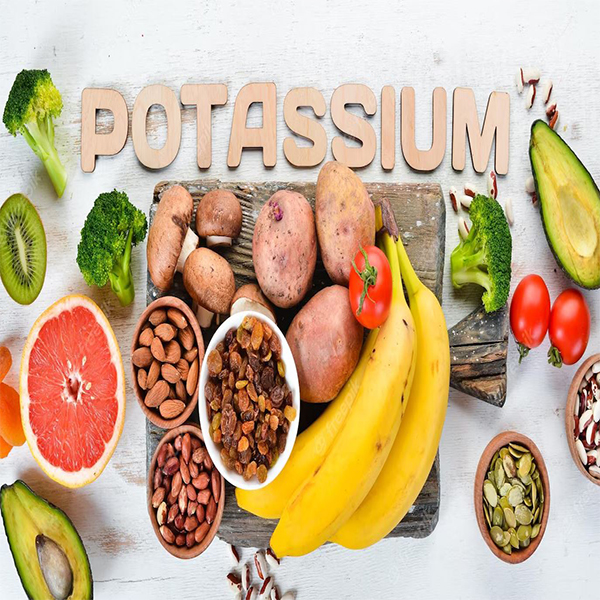
It is also recommended to consume large amounts of fruits and vegetables because these foods are low in sodium and fat and help to lose weight and control it. Consuming more fruits and vegetables increases potassium intake, which helps to reduce high blood pressure.
Another reason to reduce salt intake is that high salt intake (high sodium) increases urinary excretion of calcium and thus increases the body's need for calcium. Currently, it is not possible to say who may develop high blood pressure with high salt intake. But reducing sodium intake can be beneficial for any normal adult.
Alchemy salt has very little sodium, and this feature has been added without changing the actual taste of the salt, and we are not satisfied with these, and new salt containing potassium, iodine, and iron is also under development. In addition to regulating heart rate and improving heart function, this salt also prevents the formation of kidney stones.
What is the benefit of potassium for the human body?
Potassium is one of the nutrients needed by the body. This mineral increases vitality and mobility in a person, controls high blood pressure and reduces the risk of stroke.
Potassium reduces anger
Consuming potassium reduces anger and as a result increases vitality and mobility in a person.
Potassium
Every cell has a sodium-potassium pump that pumps sodium out of the cell and potassium into the cell. Accordingly, if sodium is not pumped out of the cell, water accumulates in the cell and causes it to swell or rupture. .
This pump is particularly important for muscle and nerve activities, and this is why potassium deficiency affects muscles and nerves first.
Lack of potassium also causes a decrease in stored glycogen levels, and this can slow down exercise by rapidly reducing energy and cause severe muscle weakness and fatigue, which are one of the first symptoms of deficiency.
potassium. Helps control high blood pressure
Many researches have shown that a diet low in potassium and sodium plays an important role in cancer and cardiovascular diseases.
Dr. Ebadi Namak Kimia: Potassium is one of the seven essential minerals. Other essential minerals include calcium, magnesium, phosphorus, sodium, chloride, and sulfur. We need at least 100 mg of potassium per day to support key body processes. Adequate potassium intake is associated with a 20% reduction in all-cause mortality, a reduced risk of stroke, lower blood pressure, protection against muscle loss, and reduced kidney stone formation. The primary function of potassium in the body is to regulate fluid balance and control the electrical activity of the heart and other muscles. As you know, potassium is an electrolyte that counteracts the effects of sodium in the body and helps maintain blood pressure at a healthy level. This substance is also necessary to maintain acid-base balance in the body.
Allowed and recommended intake of potassium:
The permissible and sufficient intake for potassium is about 4700 mg per day for adults. Most adults consume less than this amount. According to studies conducted at the National Institute of Health and Nutrition, the average potassium intake for Americans is 2,640 milligrams per day, which has remained unchanged since 1990. The institute also stated that less than 2% of people consume 4,700 milligrams of potassium per day. The World Health Organization recommends 3,510 milligrams per day and believes that most of the world's population does not get this amount properly. Potassium supplements are available in pharmacies, but it is better to get the minerals and vitamins needed by the body through food. Studies and research have confirmed that isolating a specific mineral in supplements and consuming it alone cannot provide good health for the body. It is the same with food. The diet will be useful for the body to provide all the minerals and vitamins needed by the body. First, focus on the use of minerals in foods, and then go to supplements if you are not getting the required amount.
Possible properties of potassium for health: blood pressure and cardiovascular health:
Low potassium intake is associated with high blood pressure and cardiovascular diseases. Most people know that a small amount of sodium is necessary to lower blood pressure, but they are not aware that adequate potassium intake is also necessary to balance sodium in the body and lower blood pressure. Increasing potassium consumption along with decreasing sodium intake is necessary to change blood pressure and prevent cardiovascular diseases. In a study conducted, people who consumed about 4069 mg of potassium per day had 49% less heart diseases than other people.
Maintenance of muscles and bones:
Foods rich in potassium can create an alkaline environment in the body. Metabolic acidosis is triggered by the consumption of acid-rich foods such as meat, dairy products and refined grains, and this will cause the loss of bone and muscle mass in the body. Studies show that people who have an average of 5266 mg of potassium consumed per day, they have preserved more muscles.
Dr. Ebadi Namak Kimia: Potassium is one of the nutrients needed by the body, which is effective in the balance of water and electrodes along with other nutrients.
This mineral (potassium) plays an effective role in nerve and muscle activities and substances like (calcium and magnesium).
One of the other important benefits of potassium for the body is the reduction of blood pressure and the prevention of this complication and its cell growth. Also in this field